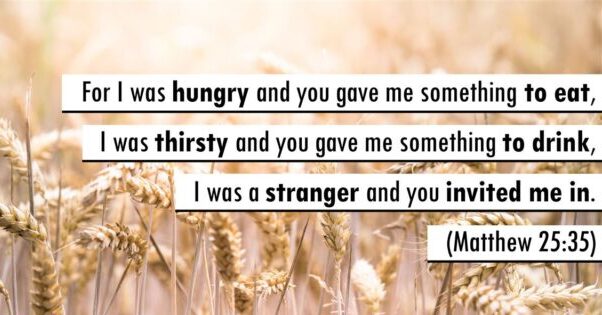Dear members and friends —
This summer we have been walking through the earliest days of Christianity, reading the first accounts of the formation of the followers of Jesus after his death (and resurrection). One critical element of these gatherings—the formations of our modern day Christian church, in all its many varieties—is a generous joy in sharing together. The other week we read in the second chapter of Acts, how in addition to collectively owning all their property and income together, that they “broke bread in their homes, and ate together with glad and sincere hearts.” These so-called “love feasts” were a continuation of the breaking of bread of the Lord’s last supper, and the command to “do this in remembrance of me.”
Growing up in the more conservative Swedenborgian tradition that I did, the Lord’s holy supper was often a somber and silent affair, only available to adults who had been confirmed in the faith of that particular denomination. At our church in San Francisco, we do something different by practicing a so-called “open table,” where all are warmly welcome to participate in communion as they wish to (or not). As a child, I did not get the impression of “glad and sincere hearts” in this ritual, let alone something like the joy of fellowship, of being together.
When have you been greeted and given a kind of generous hospitality, welcomed as a stranger, and fed? There are strong, clear teachings in the Judeo-Christian scriptures that we are to welcome, feed, and clothe the stranger, those who are different from us, those who might practice a different religion or come from a different culture. Have you yourself ever been a stranger in a foreign context, and been treated warmly and well, in spite of your difference? What did that feel like?
Part of puzzling out what “church” might mean in the 21st century seems to be in how we meet difference, and the ways we respect (or not) those who might have quite different values, languages, and beliefs from our own. We have more to learn, I believe, from these earliest Christians who often—in spite of omnipresent oppression and the threatening violence of an occupied land, under the bootstraps of an empire—joyfully broke bread together with glad and sincere hearts. If this model of a community lies behind us in history, it is something we also might anticipate in our future, as angels-in-the-making. Emanuel Swedenborg—the 18th century Scandinavian mystic our tradition takes inspiration from—describes feasts and banquets and celebrations among the different angelic communities of heaven, some of them going on for several days (the most elaborate of these accounts can be found in the so-called “memorable relations” in his book on love, Conjugial Love). The party truly goes on, and does not end with death.
I will speak more to this theme during our meditation service this Sunday, and in the meantime, perhaps you can ask yourself—when did you last welcome the stranger, and shower someone you didn’t know with gifts of food and drink, and conviviality? How might we all learn to better host “the strange stranger,” as the French philosopher Jacques Derrida put it? As so many of the other systems we are entangled in (political, economic) can sometimes seem hopelessly mired in needless cruelty and suffering, as Christians we can simply begin with how we treat others at the table around us: ideally, with “glad and sincere hearts.”
See you Sunday, with peace and blessings,
Reverend Devin

